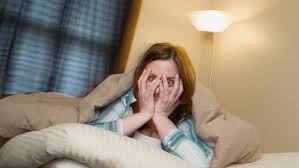Panic attacks can be a real problem leading to an intense sensation of fear. They usually occur during the day, affecting a person’s life. However, panic attacks can occur even at night while sleeping. If they occur at night, they are known as nocturnal panic attacks. Nocturnal panic attacks affect many people, leading to extreme fear and causing extreme distress, waking a person from sleep. Often, these panic attacks when sleeping lead to sleep deprivation problems the following day. If a person doesn’t sleep well, or if a person is afraid to continue sleeping due to panic attacks, it’s normal not to be able to function properly the next day.

What Causes Panic Attacks While Sleeping?
Nocturnal panic attacks occur without any trigger and wake a person from sleeping. Just as the panic attacks which occur during the day, panic attacks when sleeping, are characterized by extreme fear, faster heartbeat, heavy breathing, shortness of breath, excessive sweating, trembling, flushing, etc. A good thing with panic attacks is that regardless if they occur during the day or while sleeping they are harmless and not dangerous at all. Even though it might look like a person is in a serious condition, it’s all only due to extreme fear and nothing else.
Panic attacks when sleeping last only for a couple of minutes. However, a person might need hours to calm down and be normal again. Often those experiencing panic attacks while sleeping have panic attacks also during the day.
What are the causes of panic attacks at night? Here are the most common causes of nocturnal panic attacks:
GERD – Gastroesophageal Reflux Disease
GERD is a condition affecting the gastrointestinal system, but it can also affect the quality of sleep. This is especially true if you consume a large meal before going to sleep. GERD signs and symptoms like stomach pressure, sweating, lightheadedness, chest pain and hyperventilation lead to panic attacks when sleeping.
Sleep Apnea
One of the most common causes of panic attacks when sleeping is obstructive sleep apnea. A construction in the upper respiratory system leads to hypoventilation or no breathing. It only lasts for a couple of seconds which can trigger cardiac stress and other symptoms similar to those of a heart attack. Obstructive sleep apnea is a condition affecting especially overweight and obese people.
Nightmares
Nightmares are another cause of panic attacks while sleeping. It does wake up a person from sleep causing hyperventilation, faster heartbeat, etc. All these symptoms of a nightmare can trigger a panic attack.
Hyperventilation Syndrome
Hyperventilation syndrome is another cause among other panic attack causes. It is believed that panic attacks lead to hyperventilation, but on the other hand, hyperventilation becomes a condition that eventually triggers the panic attacks, regardless if they occur during the day or while sleeping.
But what is hyperventilation? Hyperventilation is a condition characterized by shallow breathing. If a person has shallow breathing, he/she will not get the necessary amount of oxygen that the body needs. Also, too much carbon dioxide is exhaled with every shallow breathing. When a person breathes too shallow than normally it doesn’t give the lungs the necessary time to exchange oxygen which is inhaled with carbon dioxide which is created in the body and needs to be exhaled. Hyperventilation syndrome is not one of the most common causes of panic attacks when sleeping as people who have this syndrome in general, have no problem sleeping at night.
How to Deal with Panic Attacks While Sleeping
Dealing with a panic attack that has wakes you up from sleep is more difficult than that during the day. Normally, in sleep you have no time to be warned and to be prepared. Traditional coping techniques that help you deal with panic attacks during the day can help you deal with panic attacks during the night as well.
First of all, don’t ignore the symptoms and try to get back to sleep. It will only make the situation worse and cause frustration and even an aggravation of the panic attack symptoms. Instead, get up from the bed, turn on the light and try focusing on the actual moment. Tell yourself that there is nothing for you to be scared and frightened, that there is nothing that will endanger your life, but that all are only symptoms of a panic attack. Talking to yourself might be helpful as well as it will stop your hyperventilation and manage your breathing. Keeping a panic journal might be helpful too. You can write about the symptoms that you experience, when the panic attack started, when it stopped, what triggered it, etc.
Another thing that can help you deal with panic attacks while sleeping is to focus on breathing. Breathe deeply through nose and exhale through mouth. Continue focusing on your breathing until you notice that you have started to calm down, your breathing has started to regulate and your heartbeat has slowed down. If your healthcare provider has prescribed you anti-anxiety medications that you should take them as well. These medications will help you calm down faster.
